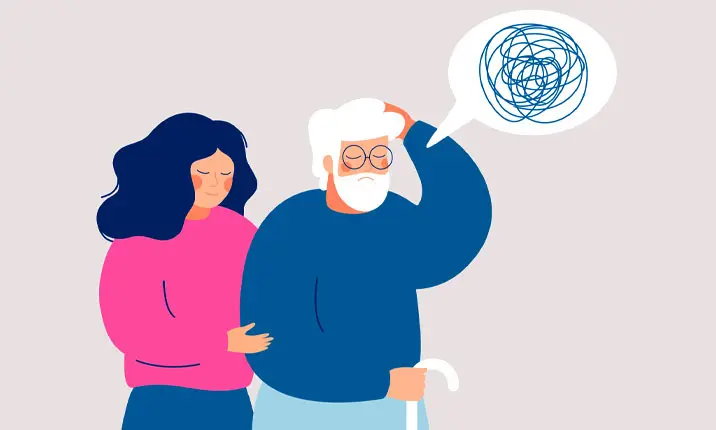Dementia is a growing epidemic in Singapore and a major cause of disability among seniors. The Wellbeing of the Singapore Elderly (WiSE) study, led by the Institute of Mental Health in 2015, showed that 1 in 10 Singaporeans above the age of 60 may have dementia. And come 2030, some 130,000 people may be affected by dementia, according to the Agency for Integrated Care.
Read on to learn more about dementia, how to spot the condition, and how your family doctor can help in screening and managing the condition.
What is dementia?
Dementia is a neurodegenerative disorder whereby a person's cognitive function deteriorates beyond what is expected from normal biological ageing. A chronic disease, dementia affects one's memory, orientation, thinking, comprehension, mood, social abilities, language, judgement and learning capacity. The loss in cognitive functioning can sometimes be accompanied or preceded by changes in emotional control, mood, motivation and/or behaviour.
Types of dementia
There are 4 main types of dementia, each resulting from a different pathology in the brain:
- Alzheimer's disease
This is the most common type of dementia whereby there is a build-up of a type of protein in and around the brain cells. - Vascular dementia
This results from disease or direct harm to the brain, mainly in the form of stroke. The onset of this type of dementia is usually acute in nature and the symptoms encountered will depend on the location and the severity of the damage. - Lewy body dementia
This is another type of dementia that happens from the build-up of abnormal structures called Lewy bodies inside the brain's cells. Patients with this form of dementia often exhibit changes in their movement, behaviour and thinking. - Frontal-temporal dementia
This is a form of dementia that is characterised by marked changes in the person's personality and, to a certain extent, affects language capabilities.
Signs and symptoms of dementia
Early signs of dementia can be subtle, and are often mistaken as part of normal ageing. Having the knowledge and awareness of these early signs and symptoms are important so that prompt medical intervention can be started.
The symptoms of dementia vary from person to person, and are also dependent on the cause of dementia. They include:
- Short- and long-term memory loss
- Difficulty in performing familiar tasks or executing complex tasks
- Difficulties in word finding or communication
- Difficulties in organisation and planning
- Difficulties in co-ordination and physical movement(s)
- Difficulties in problem solving, reasoning and judgement
- Difficulties with visual spatial abilities
- Confusion and disorientation
Some patients may also exhibit psychological changes such as:
- Depression
- Anxiety
- Inappropriate behaviour
- Agitation
- Paranoia
- Hallucinations
- Personality changes
Dementia risks and prevention
While dementia cannot be prevented with absolute certainty, there are certain ways to reduce one's risks of developing dementia. For example, regular exercise and maintaining social contact with family and friends can help to improve a person's physical and emotional well-being.
Staying mentally active with intellectually stimulating activities can also keep one's mind sharp. Finally, keeping blood pressure, sugar control and cholesterol levels within an acceptable range and avoiding excessive alcohol consumption and smoking will also reduce one's risk of heart diseases and stroke.
Screening for dementia
There are several ways to screen for dementia. Examples of tools that are commonly used in general practice include the Abbreviated Mental Test (AMT) and Mini Mental State Examination (MMSE). These consist of a series of questions that assess various aspects of cognition, such as memory, recall, attention, orientation, calculation, and visuospatial skills.
Should caregivers, family, or close friends notice a decline in a suspected patient's memory, or notice them having difficulty in performing activities of daily living, please consult your family doctor as soon as possible.
While there is no definitive cure or treatment to halt the progressive deterioration in cognition, early diagnosis of dementia can still make a difference in the patient's life.
Diagnosing dementia
There is no single tool for diagnosing dementia. The diagnosis journey involves several steps that include an initial medical history and examination, cognitive assessments that will assess the person's memory and thinking ability, a series of laboratory tests and brain scans.
In some instances, psychiatric evaluations would also be done to exclude possible underlying mental health conditions that may be the cause of the symptoms other than dementia.
Managing dementia
Treatment and management of dementia will depend on its underlying cause.
A two-pronged approach (pharmacological and non-pharmacological) is usually adopted with the objective to improve the patient's quality of life, maximise functional independence, and minimise emotional and behavioural changes.
Non-pharmacological interventions such as therapeutic activities, recreational activities and psychological activities are usually the first-line treatment. They have been shown to be twice as effective as antipsychotics medications and carry less risks when treating symptoms such as depression, anxiety, irritability, agitation, aggression, delusions and sleeping problems.
Pharmacological treatments involve the use of cognitive enhancers such as acetylcholinesterase inhibitors (e.g. donepezil, rivastigmine and galantamine) and memantine. These medications are mostly prescribed to treat patients with Alzheimer's disease. In some cases, they are given to patients with Lewy body dementia or mixed dementia.
Cognitive enhancers do not cure dementia or alter the underlying disease process. Instead, they work by boosting or regulating the chemical messengers of the brain that is involved in memory, judgement, and learning.
Through the course of the treatment, monitoring of the patient's response with both objective and subjective parameters would be done periodically to track outcomes. To maximise therapeutic benefits, physicians will often combine medications with non-drug therapy.
Supporting a loved one with dementia
Dementia affects not only the patient, but also the lives of their family and loved ones. Most of the time, major lifestyle and environmental changes have to be made.
Thankfully, there are agencies, such as Dementia Singapore and Agency of Integrated Care, that help patients as well as their family members and caregivers in coping with the burden of the disease.
These agencies provide useful online resources and tools, caregiver support services and daycare services that can help the patient and their family deal with this condition that is progressive and unpredictable.
Your family doctor can share more advice and information about dementia. If you suspect a loved one has dementia, get in touch with our friendly physicians at a Parkway Shenton clinic near you.















